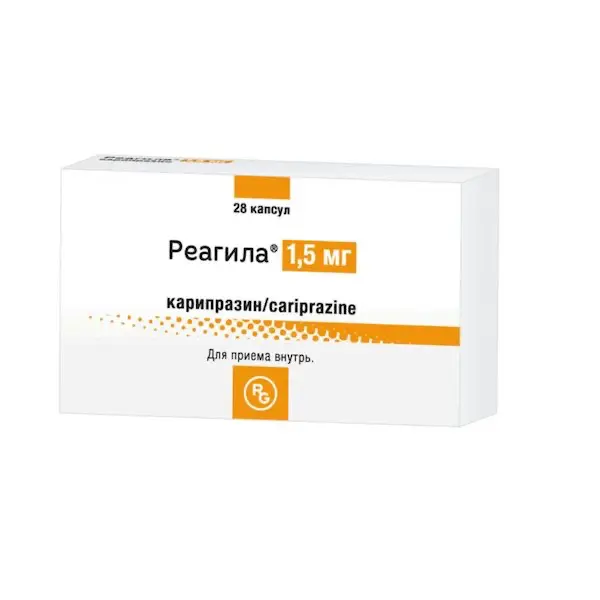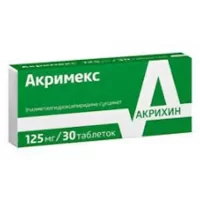Description
Reagila Pharmacodynamics
Mechanism of action
The mechanism of action of cariprazine is not fully known. Nevertheless, it is assumed that the therapeutic effect of cariprazine is provided by a combination of partial agonism towards D3-, 02-dopamine receptors (Ki value 0.085-0.3 nmol/l vs. 0.49-0.71 nmol/l and 5-HT1A-serotonin receptors (Ki values of 1.4-2.6 nmol/L) and antagonism to 5-HT2B- and 5-HT2A-serotonin receptors and H1-histamine receptors (Ki values of 0.58-1.1 nmol/L, 18.8 nmol/L and 23.3 nmol/L, respectively). Cariprazine has low affinity for 5-NT2C-serotonin and alpha1-adrenoceptors (Ki values of 134 nmol/L and 155 nmol/L, respectively). Cariprazine has no significant affinity for muscarinic cholinergic receptors (Ki50>1000 nmol/L). The two main active metabolites, desmethylcariprazine and didesmethylcariprazine, have a similar receptor binding and functional activity profile in vitro as the parent drug.
Pharmacodynamic Effects
Preclinical in vivo studies have shown that cariprazine binds to D3 receptors at pharmacologically effective doses as much as it does to D2 receptors. We observed dose-dependent binding of cariprazine to D3 and D2-dopamine receptors in the brain (predominantly in the areas dominated by D3-receptors).
The effect of cariprazine on the QT interval has been studied in patients with schizophrenia or schizoaffective disorder. 12-hour Holter ECG monitoring data were obtained in 129 patients before the drug was prescribed and after reaching equilibrium state. No QT interval prolongation was observed when cariprazine was used in doses exceeding the therapeutic ones (9 mg/day or 18 mg/day). No QTc interval prolongation by >60 ms from baseline or QTc prolongation >500 ms during the study was registered in patients receiving cariprazine within the study.
Clinical efficacy
Schizophrenia
Efficacy in short-term use
The efficacy of cariprazine in acute schizophrenia was studied in three 6-week, multicenter, international, randomized, double-blind, placebo-controlled studies involving 1,754 patients aged 18 to 60 years. The primary endpoint in all studies of acute schizophrenia was change in baseline overall score on the Positive and Negative Syndrome Scale (PANSS) after 6 weeks, the secondary endpoint was change in baseline score on the General Clinical Impression of Severity (CGI-S) scale after 6 weeks. In an international placebo-controlled study using fixed-dose cariprazine 1.5 mg, 3.0 mg, and 4.5 mg and risperidone 4.0 mg, a statistically significant improvement in primary and secondary endpoints was demonstrated for all doses of cariprazine and active controls compared with placebo. In another international placebo-controlled study using fixed doses of 3.0 mg and 6.0 mg cariprazine and 10 mg aripiprazole for sensitivity analysis, both doses of cariprazine and the active control resulted in statistically significant improvements in both the primary and secondary endpoints compared with placebo. In a third international placebo-controlled study using fixed/flexible 3.0-6.0 mg and 6.0-9.0 mg doses of cariprazine, both groups of cariprazine doses resulted in statistically significant improvements in both the primary and secondary endpoints compared with placebo.
- Reagila® is taken orally once a day at the same time, regardless of meals.
- Doses
- Schizophrenia
- The recommended starting dose of cariprazine is 1.5 mg once daily. Thereafter, the dose is slowly increased in increments of 1.5 mg/day up to a maximum dose of 6 mg/day. The minimum effective dose is determined by the attending physician on the basis of clinical evaluation. Due to the long elimination half-life of cariprazine and its active metabolites, dose changes have little effect on plasma concentrations for several weeks. Adverse reactions and patient response to therapy should be monitored for several weeks after starting cariprazine and after each dose change (see section “Pharmacokinetics”).
- Manic or mixed episodes in bipolar disorder type 1 The recommended dose range is 3 mg to 6 mg once daily. The initial dose of cariprazine is 1.5 mg and may be increased to 3 mg on day 2. Depending on clinical response and tolerability, further dose increases may be made in increments of 1.5 mg or 3 mg. The maximum recommended dose is 6 mg/day. In short-term controlled trials, doses above 6 mg/day do not provide efficacy gains sufficient to outweigh dose-dependent adverse reactions.
- Depressive episodes of bipolar disorder type 1 (bipolar depression) The starting dose of cariprazine is 1.5 mg once daily. Depending on clinical response and tolerability, the dose may be increased to 3 mg once daily on the fifteenth day. The maximum recommended dose is 3 mg once daily.
- Switching from other antipsychotics to cariprazine
- When switching from treatment with other antipsychotics to treatment with cariprazine, gradual cross-titration with gradual reduction of the dose of the previous drug while starting cariprazine should be considered.
- Transition from cariprazine to other antipsychotics
- When switching from treatment with cariprazine to treatment with other antipsychotics, gradual cross-titration is not necessary; the new antipsychotic medication should be started at the lowest dose after cariprazine is withdrawn. Note that plasma concentrations of cariprazine and its active metabolites will decrease by 50% after approximately 1 week (see section “Pharmacokinetics”),
- Special patient groups Older age
- There is insufficient data on the use of cariprazine in patients 65 years of age or older to detect differences in response to treatment compared with younger patients (see Pharmacokinetics section). Dose selection in elderly patients should be conducted with greater caution.
- Impaired renal function
- In patients with mild to moderate renal impairment (creatinine clearance (CK) >30 ml/min and <89 ml/min), no dose adjustment is required. Safety and efficacy of cariprazine in patients with severe renal impairment (CKR <30 ml/min) has not been evaluated (see section “Pharmacokinetics”). The use of cariprazine is not recommended in patients with severe renal dysfunction. Impairment of liver function
- No dose adjustment is required in patients with mild to moderate hepatic impairment (Child-Pugh score 5-9). Safety and efficacy of cariprazine in patients with severe hepatic impairment (Child-Pugh score 10-15) has not been evaluated (see section “Pharmacokinetics”). The use of cariprazine in patients with severe hepatic impairment is not recommended.
- Administration in children
- The safety and efficacy of cariprazine administration in children and adolescents under 18 years of age have not been established. No data are available.





